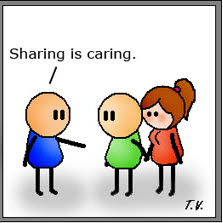Well, isn't that the life of a teacher librarian? We are constantly changing what we do and how we do it.
This summer I moved every book in my library and discarded some very old non-essential materials and made lists to replace them with 21st century materials. I also dumped all of my VHS tapes. Yes, you read this correctly. ALL VHS tapes are gone.
There are two reasons for dumping the technology. First, it is ancient technology in schools today when we have laptops instead of DVD players, LCD projectors, and electronic whiteboards. None of the teachers have VHS players in their rooms. None of the teachers have TVs in their rooms. We have one TV in the entire building located in the lobby and it is not to be used for TV shows.
Second, like most people we download, we subscribe, we stream, or we play from a DVD in our laptops. We may be replacing student laptops with Chromebooks so we will only have teacher laptops left in our building. So, out with the VHS tapes. I have spent a lot of time ridding the library of ancient tech and I think I am almost at the end. Baby steps but steps indeed.
Third, I needed the space for my students. I teach in a PK - 4th grade school where very few children reach my shoulder before 4th grade. Due to lack of space my books were shelved on 72" shelves where many students could not reach them and certainly did not maintain the integrity of the shelf once a book was removed. I spread out the books by reclaiming four three-foot 72" tall units and so could lower books for my shorter students, raise individual shelf height to accommodate tall books and make the library look much neater.
I shifted my non-fiction materials, weeded a few I went, to take back those shelves. By doing so I was able to shift my biographies into the non-fiction section and put them at a better height as well. I also reorganized my picture book section by AR level. Our school enjoys using AR and I wanted to make the sections more distinct. I spent a great deal of time color coding levels and reshelving. Books without AR quizzes are shelved at the end of the section to be revisited and enjoyed.
I finished reorganizing the fiction section of the library by genre. My students loved that I did this last year as it made the sections easier to access and when students asked where the fiction sports books were shelved, I could point to a section. I also removed a computer table and two chairs in order to make way for two recycled seating benches. I want my kids to enjoy sitting and reading on days where we are free to just read.
My next goal is to replace some of the old furnishings in the library. I have a GoFundMe account set up so if you are interested in see what has been done and want to help out, go here:
http://www.gofundme.com/SESLibrary
Thanks and enjoy!
Shawn


